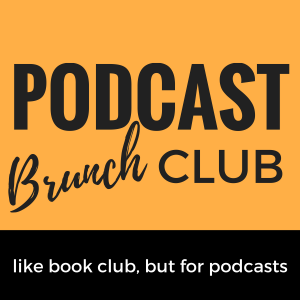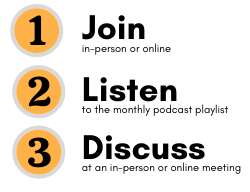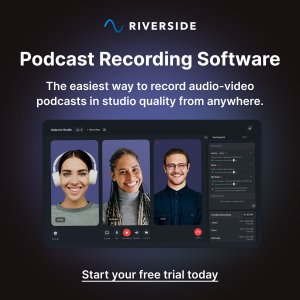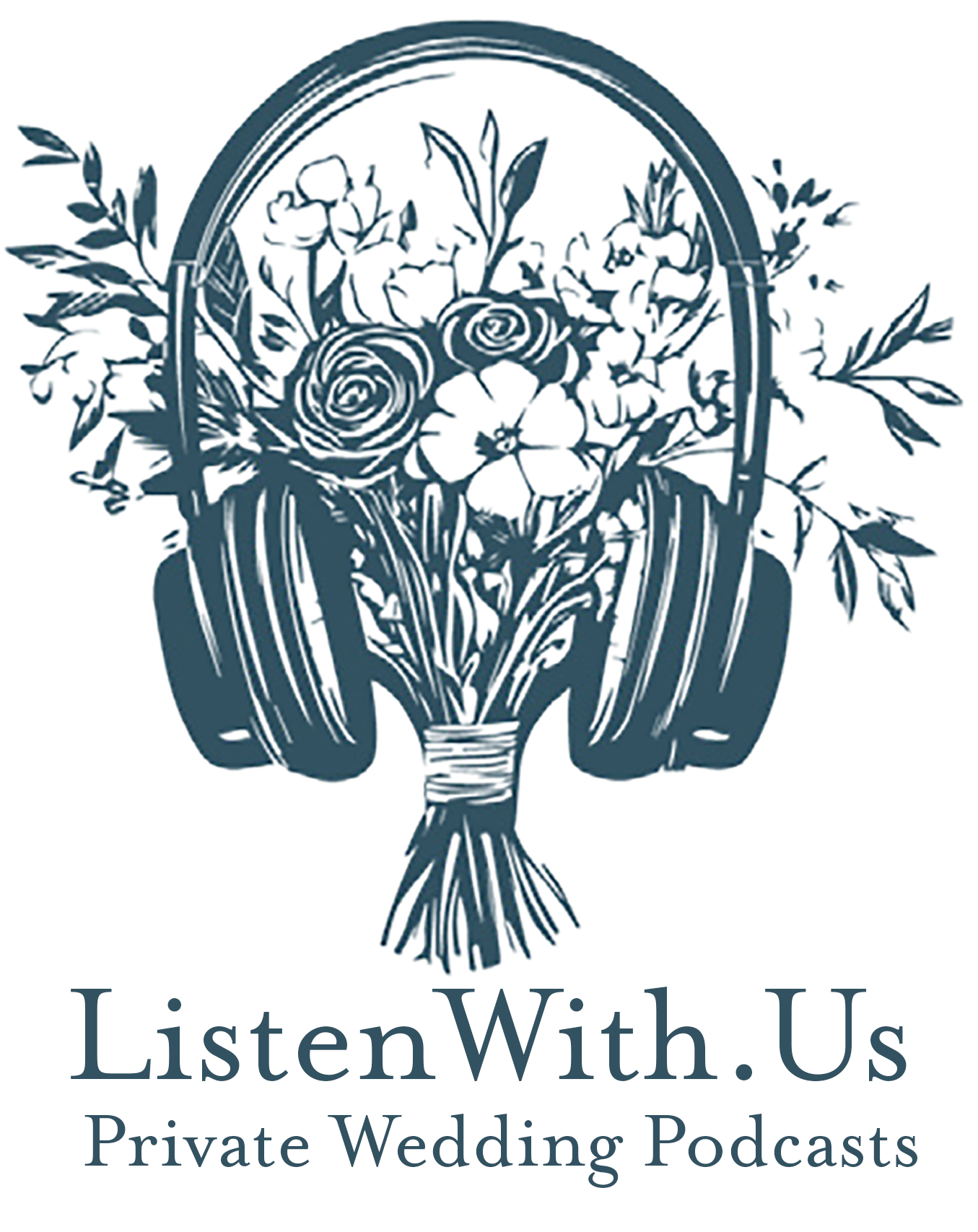Creating a Podcast Focused on Civics: What I Learned
by Mila Atmos, host and executive producer of Future Hindsight.
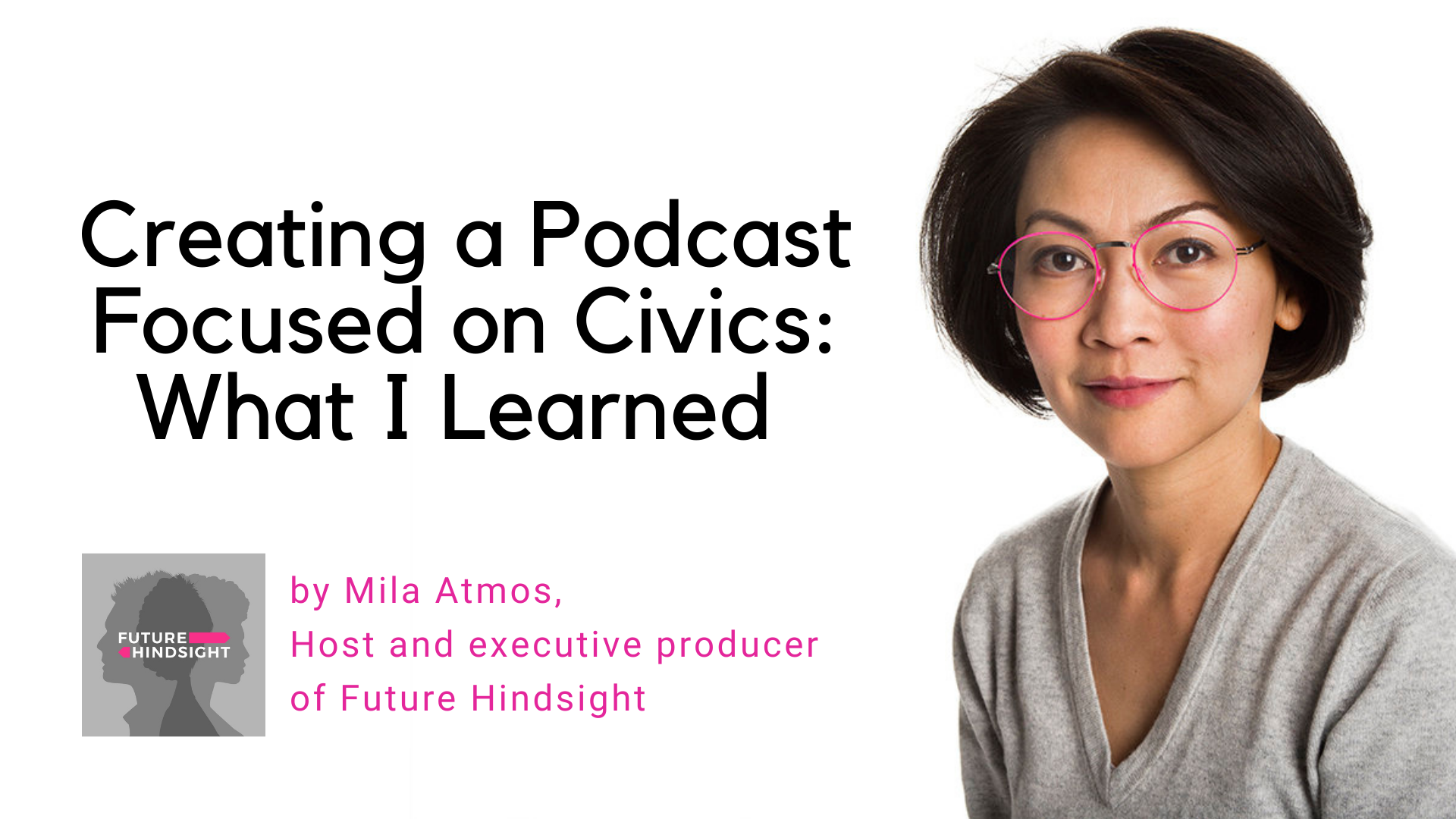

In these last four years, I’ve gotten a PhD in what’s possible. When I started Future Hindsight in 2018, I wanted to find out how we (yes – you and me) can be involved in our communities on a local, state, and/or national level that goes beyond voting, but is short of running for office.
I was convinced that what ailed us in our political discourse and our political outcomes could be cured by deeper engagement from everyday people in civic life. I knew that everyday citizens can improve the way we talk about and act upon the issues that face our society. We can influence our politics and demand better governance.
On each show, I interview citizen changemakers. These are everyday citizens – volunteers, activists, students, experts, academics, and even politicians – who are truly dedicated to tackling the issues that vex us. They endeavor to make our society function better. I’ve also learned that big ideas and solutions are already available to address our most trenchant issues. There is much hope for the future of humanity!
Future Hindsight’s first four years contained 16 seasons, each taking a deep dive into an issue from various angles. We looked at poverty, climate, racism in America, building political power, the social contract, and more.
Over the last four years, I learned more than I could have possibly conceived! I learned to listen more closely, to re-evaluate what I thought I knew, to widen my perspective with more information, and honestly: to change my mind! What a tremendous journey.
I can’t encapsulate everything I’ve learned in a tidy box, but here are five takeaways that have resonated across all episodes and seasons:
1. Issues are complicated
First, issues are complicated. Problems like the climate crisis, racism, criminal justice, education, or poverty are more complex than we may think. We are bombarded with information and data on our phones, laptops, and social media. In spite of that, it’s often difficult to see the truth. For example, some think poor people deserve to be poor. But what I learned through research and interviews on Future Hindsight is that poverty truly is a systems problem. It’s not the result of personal or moral failure, which means that the popular solution of providing more access to high quality education will not eradicate poverty. When I talked with Mark Rank on the podcast, he used the game of musical chairs as an analogy for why poverty exists. Rank says it isn’t that people are lazy or stupid, it’s that we are always short of chairs – short of jobs or opportunity – for all the people who need them. The beauty of this analogy is that it’s easy for us to understand. We’ve all played the game of musical chairs. If we accept his premise, then we can think of solutions to poverty that address the system. We need to increase the amount of chairs. We need to find or create new well-paying jobs for people.
2. Critical thinking is critical
Because the issues that plague us are complicated, we need to be well informed and exercise our critical thinking skills whenever we take in information. We need to go beyond the headlines across all media, and be alert to disinformation and bad ideas. The groundwork involves being up to speed with local news. Subscribe to your local newspaper to read up on local politics and your community. Learn about what the movers and shakers in your neighborhood are up to that will likely impact your life. Apply the same kind of rigorous research to understanding national issues. Most importantly: make up your own mind about what you read, see, and hear. For example, instead of only reading an article about what a politician said, read the transcript yourself. Or watch the entire speech instead of watching a 20-second sound bite clip on social media. When I spoke with Andy Norman about inoculating ourselves against bad ideas, he shared good tips on boosting your critical thinking skills. Ask clarifying questions. If you encounter new information, ask yourself how it fits with what you already know. Be open to changing your mind. He says that one of the best ways to strengthen mental immunity in yourself and others is to have the difficult conversations you might otherwise shy away from. Asking hard and often philosophical questions like “What is a bad idea?” or engaging with family and friends who hold bad ideas can actually boost your mental immunity. Thinking together and exchanging honest dialogue is the best way to spread good ideas and build mental immunity.
3. Public policy works
I’ve always been a believer in public policy as an effective agent for changing behavior. For example, as a society we were interested in reducing motor deaths. After the government made seat-belt wearing mandatory, we accomplished the desired outcome of fewer deaths in car accidents. Public policy is very good at producing desired outcomes. Sometimes we disagree with the policy and the outcome: voter ID legislation was ostensibly implemented to make elections more secure. Whether election integrity is enhanced is unclear, but it effectively reduced access to the ballot box. It has accomplished voter suppression, which is actually what this law was designed to do. There is a popular myth that government does not work, but the success of public policies in action debunks that theory. Public policy can be achieved through legislation, regulation, funding priorities, or simply what the government chooses to do. Segregation, for example, is an intricate web of public policies over many years by the government that successfully curbed many African Americans from accessing home ownership, high quality education, and good jobs. The power of public policy is exemplified in this episode with Richard Rothstein, the author of The Color of Law: A Forgotten History of How Our Government Segregated America.
4. Local and state elections matter
Given the power of public policy, it is apt that local and state politics are vitally important to how our society functions on a daily basis. What happens at this level of government affects you directly. In New York City, when Mayor Bloomberg wanted to make the city’s streets safer for bikes, his administration added nearly 400 miles of bike lanes. It increased traffic in my neighborhood because one whole lane had been taken away for bikes, which I thought was really annoying. On the other hand, the expanded network of bike lanes did increase bike ridership and made riding a bicycle to work a real option for New Yorkers. Conversely, do you want a speed bump on your street? Reach out to your local department of transportation as well as your locally elected representative, and advocate for it. Is your state restricting the freedom to vote? Make sure you vote for the state representative who stands up for voting rights! My favorite episode about the immense power of local and state legislatures is with Alex Hertel-Fernandez. He wrote a book called State Capture, which shows the methodical way conservatives have worked together with ALEC and AFP to elect representatives at the state level, who have then enacted conservative policies in areas like election rules and climate regulations.
5. We’re more powerful than we think
Finally, American citizens have a lot of power in our democracy. We are more powerful than we think we are. Does our one vote make a difference in any given election? It does! Otherwise, there would be no movement to suppress votes through voter ID laws, like in Texas, or to gerrymander districts. Remember that our vote is especially powerful at the state and local level. Voter turnout in these local elections is historically low. The turnout in the NYC mayoral election last year was around 23% on election day. However, the impact of these elections on our lives is very high. In addition to what traffic changes might be coming near you, think of the local school board elections that have riled up the country in the past two years. Our voices are best heard when we show up in person. Attend your elected representative’s town hall. If you have a school age child, go to the local school board meetings. In our episode with Eitan D. Hersh, he shows us not only how powerful we are, but also how we can effectively wield that power to solve the problems that face our community.
At Future Hindsight, we take big ideas about civic life and democracy and turn them into action items for you and me. We love to share what we’ve learned so that your engagement can have the most impact.
In this midterm year, we know it’s doubly important to build our civic action toolkits and be abreast of the issues. So we’re taking a big leap from seasonal deep dives and bringing weekly episodes with citizen changemakers all year round!
We’ll be covering everything from election reforms to brushing up on political philosophy and speaking to candidates, and more. I hope that you’re inspired by the example of the citizen changemakers on the show and by the knowledge that you’ve gained on the issues to take action in the areas that really matter to you. Tune in!
Posted March 27, 2022.
